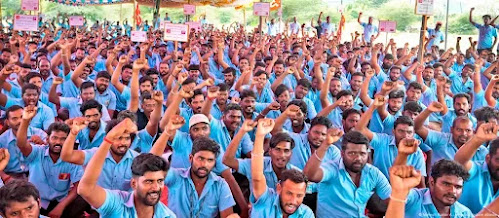Thousands of employees of the South Korean company have been on strike since September 9. They are demanding better wages, 8-hour working days, and union recognition.
Strikers have been protesting for the past four weeks in a makeshift tent near the Chennai factory
Mahesh Kumar A./AP Photo/picture alliance
Indian police on Tuesday detained around 600 employees of Samsung Electronics, one of the world's largest semiconductor and computer chip manufacturers, and union members for organizing a street protest.
For the past four weeks, thousands of employees of the South Korean company in India have been on strike over their working conditions near the factory in Chennai and at other locations.
According to senior state police official Charles Sam Rajadurai, the protesters were detained because their march was causing public inconvenience.
What are the protesters demanding?
The workers are asking for a wage increase, working days capped at eight hours, and recognition of the factory's main union, CITU.
The Chennai plant is Samsung's second-largest in the country and generates nearly one-third of Samsung's annual revenue in India, which amounts to $12 billion (€10.8 billion).
According to the union, Samsung workers in Chennai earn an average of 25,000 rupees (roughly $300) per month and want that figure to increase to 36,000 rupees within three years.
When did the protests begin?
The strike began on September 9. Since then, thousands of Samsung workers in India have been demonstrating in a makeshift tent near the factory.
The union claims that police are detaining thousands of workers. "Since September 9, at least 10,000 workers have been detained," said union member S. Kannan to the EFE news agency, albeit adding that most were soon released.
Local media have also reported hundreds of arrests in recent weeks.
So far, negotiation attempts have failed, increasing tension between the company and the strikers.
Indian police on Tuesday detained around 600 employees of Samsung Electronics, one of the world's largest semiconductor and computer chip manufacturers, and union members for organizing a street protest.
For the past four weeks, thousands of employees of the South Korean company in India have been on strike over their working conditions near the factory in Chennai and at other locations.
According to senior state police official Charles Sam Rajadurai, the protesters were detained because their march was causing public inconvenience.
What are the protesters demanding?
The workers are asking for a wage increase, working days capped at eight hours, and recognition of the factory's main union, CITU.
The Chennai plant is Samsung's second-largest in the country and generates nearly one-third of Samsung's annual revenue in India, which amounts to $12 billion (€10.8 billion).
According to the union, Samsung workers in Chennai earn an average of 25,000 rupees (roughly $300) per month and want that figure to increase to 36,000 rupees within three years.
When did the protests begin?
The strike began on September 9. Since then, thousands of Samsung workers in India have been demonstrating in a makeshift tent near the factory.
The union claims that police are detaining thousands of workers. "Since September 9, at least 10,000 workers have been detained," said union member S. Kannan to the EFE news agency, albeit adding that most were soon released.
Local media have also reported hundreds of arrests in recent weeks.
So far, negotiation attempts have failed, increasing tension between the company and the strikers.
How has Samsung reacted?
Samsung has threatened striking workers with dismissal, although it says it is open to negotiating a consensus solution with them.
According to the company, workers at the Chennai factory earn nearly twice as much as similar workers in the same region.
The South Korean company also operates another factory in India, located in Noida, near New Delhi.
Samsung employees at factories in South Korea, the country’s largest company, also went on strike earlier this year.
The National Samsung Electronics Union (NSEU) represents 24% of the company's workforce there, with around 31,000 members.
fmf/msh (Reuters, EFE)

No comments:
Post a Comment